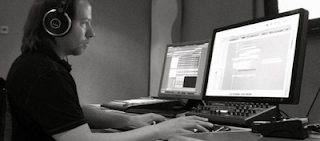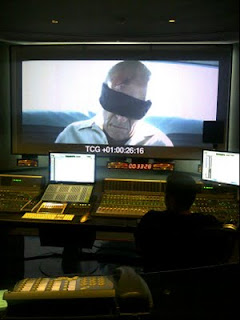This is a repost from a feature I wrote for GoIntoTheStory.com on my attempts to break into Hollywood. Though much of the information below is contained on this blog, I feel this is a rather succinct description on what's happened to me so far. Enjoy!
In June 2006, recently engaged and having just graduated
from college, I won an MTV Movie Award for my short film The Beautiful Lie in the Best Film on Campus category. I was the
first ever recipient, as it was the category’s inaugural year; and there have
only been two other winners since. Zack Braff presented me the iconic Golden
Popcorn; I gave an acceptance speech in front of stars like Christian Bale, Steve
Carrell, Eva Mendes, John C. Reilly, Will Ferrell, Sasha Baron Cohen, Kate
Beckinsale, and director Spike Lee; and the pre-taped show aired a week later
in front of millions of home viewers. I thought that I was set, that the
Hollywood doors were now open to me, and that my success was virtually
guaranteed. Most people would have probably agreed.
Well, as it turns out, not a whole hell of a lot of people
watch the MTV Movie Awards, especially not in the industry. Though I received a
number of phone calls from production companies and managers after MTV posted
an ad in Variety with all the nominees,
little press covered the results of the show and even fewer outlets listed the
mtvU Best Film on Campus category at all. I was invited by Kevin Spacey to
attend a party for Triggerstreet, where I had the chance to meet Dana Brunetti;
I scheduled a handful of general meet-and-greets; and due to my win being
featured in The Seattle Times, I struck
up a conversation with my dental hygienist who mentioned I should connect with
her son, which is how, funny enough, I met my current manager.
All of the things that I thought (and in all honesty,
somewhat expected) would happen following the MTV Movie Awards didn’t happen in
the weeks and months that followed; nor have they happened to date. I did not
sell a screenplay, I did not sign an agent, and I was not on my way to
directing a feature film. And I made a number of mistakes, like sending out my
feature script before it was really ready. But I did do one thing right: I
moved to LA.
A year after the win, I was offered the chance to write,
direct and produce The Ronnie Day Project,
a six-part music video series for mtvU and Epic Records. It was my first
professional directing gig. However, during its six-week distribution on mtvU,
Epic Records dropped Ronnie Day as well as its support of the project. I
directed several music videos for artists at MySpace Records and Universal
Music Group after that, but they were gigs all generated by myself and did not
receive major distribution or backing from their labels. Thus, like Ronnie Day,
they were not widely seen.
By this point in 2007, I was married, with a wife who, though
completely supportive and understanding of my passion and goals, required me to
have a steady income. So, I took a job in retail. While not ideal, it gave me a
lot of freedom, it was low stress, and it enabled me to write at night. I
continued working on two feature screenplays with my writing partner, Travis
Oberlander.
Then the financial crisis hit, and the income at work, which
was based only on my sales commissions, started to dwindle. I had been sending
out resumes daily for assistant jobs, anything that could help me get my foot
in the door, but I rarely, if ever, heard back. So, with the day job no longer
giving me the only thing I required from it (money), I decided that I needed to
take a major risk. I spoke with my wife and we decided that if I was ever going
to get my foot in the door in the entertainment industry, I was probably going
to need to start by working for free. I was going to get an internship.
It takes a massive swallowing of pride to get an internship
at the age of 25, having won an MTV Movie Award and directed music videos for
major labels, but there were a couple things I knew for sure:
1) I
did not want to be a music video director. I wanted to be a narrative feature
director and, second to that, a feature screenwriter.
2) If
I was going to spend eight hours a day doing something, I sure as hell didn’t
want to be wasting my time in retail. If I never directed a film and never sold
a screenplay, I still wanted to work in this business in some capacity, and the
only way to do that was to start as an assistant.
3) Pride
didn’t matter. I could care less about anything except finding a way to
advancing my career, no matter what I had to do to start.
Having had no success sending out blind resumes for paid
assistant work, I started applying for internships. I figured that if I could
eventually work my into a job at that
company, I would at least start meeting people who could maybe be of help or introduce
me to people who could.
I got an internship in the newly formed TV department at
Yari Film Group. I read scripts, wrote coverage, and supported the development
of TV shows. But, having not sold any shows, Yari wasn’t in a position to hire.
I interned there for a year. I really had no other opportunities. I kept
applying to other internships and assistant jobs but nothing came of it. It was
tough on my wife and me. Fortunately, she had a great job, and we were able to
make it work. We had to really cut back on our spending and, thankfully, had some
savings to fall back on.
There were a number of benefits to
my internship at Yari; it’s where everything really started to come together.
For one, I got read a lot of scripts, pretty much anything I wanted to,
including the newest scripts being sold. The second, and notably bigger
benefit, was that I became friends with the assistant I worked with. Knowing
that I was a writer, I gave him a feature comedy I co-wrote with Travis. He
liked it so much that he asked if he and his partner could take it out and try
and get it produced. Their first stop was to an assistant friend of theirs at
Guy Walks Into A Bar Productions, which produced of Elf and Meet Dave. This friend
loved it and pitched it to his bosses, convincing them to come on board as producers.
Yes! Big moment!
We spent three months working with
the producer on rewrites, during which time the assistant and his boss (the
management side of the production company) left to go work for Anthony E.
Zuiker (creator of the CSI franchise).
While getting a producer attached to our script was huge, I was still just an
intern at a company that had no plans to hire me.
It was time to leave Yari Film
Group. On a whim, I wrote the assistant who was now over at Zuiker’s company,
Dare to Pass. I asked if he knew of any opportunities, paid or otherwise.
When he got back in touch with me,
he said there might be an opportunity for me at Dare to Pass. While also
developing TV shows, the company was preparing for the release of Zuiker’s ‘digi-novel’
Level 26; Dark Origins, a traditional
book that also has a video component to it. So I started as an intern and quickly
moved into an unpaid employee position -- I stopped getting coffee and doing
script coverage and started to be assigned only those tasks related to the digi-novel.
I really threw myself into it, doing whatever it was I could, whatever I was
asked. When they were trying to figure out how to get deliverables of the
videos for press, I told them I was an editor, knew how to use Final Cut Pro,
and would be more than happy to do it. After that, I was off and running. After
four months, I was hired as a paid employee. With a first look deal at CBS and
two more digi-novels coming out, Dare to Pass was going to be busy.
In 2010, I was a part of the
development of the second digi-novel, Dark
Prophecy and also served as an editor, co-producer and B-cam operator on its
video components, which we call ‘cyber-bridges.’ I was also a part of the
development of the Dark Prophecy iPad App. By the end of 2010, I was promoted
to Director of Digital Media, tasked with development of Zuiker’s digital
projects.
Meanwhile, I continued to pursue
my own projects after-hours. (In case you’re wondering, my schedule is
something like this: 8am – 7pm work for Dare to Pass; 7:30pm eat a home cooked
dinner with my wife; 8:30pm – 11:30pm write and work on my own projects.) I
produced and directed a short film Dig
in an effort to further my own career as a director and show Zuiker what I was
capable of. Zuiker ended up coming on board as an Executive Producer.
Truthfully, Dig was really only
possible because of the relationships I had developed while at Dare to Pass.
(Many of the Dark Prophecy crew members
helped me out on the short, including John Goodwin, an Emmy award-winning makeup artist and Bill Brown, composer from CSI: NY.)
The major financial investment I
made in order to produce Dig has
started to pay off. This September, I will be directing the cyber-bridges for
Zuiker’s third digi-novel, Dark
Revelations. Ideally, someday, I’ll get to develop a TV show with Zuiker,
or maybe he’ll produce a low-budget feature of mine. We’ll see.
For me, my journey thus far has
been all about perseverance. I’ve never wanted to do anything but work in
Hollywood. Despite early recognition, I still had to work hard and take big
risks to get where I am. And I will continue to do so, until my dream is
realized. Yes, the risk of quitting my job and taking an internship could have
backfired. After all, Hollywood was still feeling the effects of the writer’s
strike, we were in the middle of the worst financial crisis since the Great
Depression, and Hollywood was shedding jobs like crazy. But I had to do it. And
I have no regrets.

























